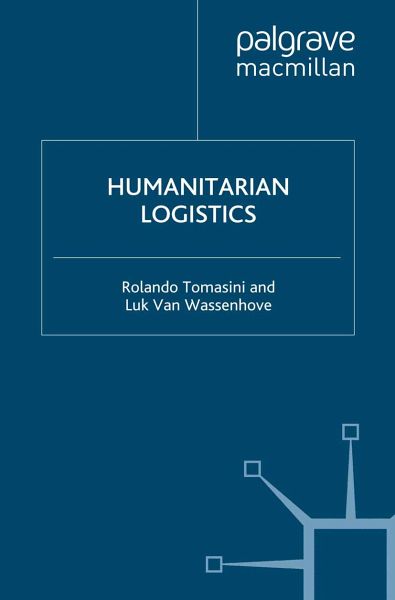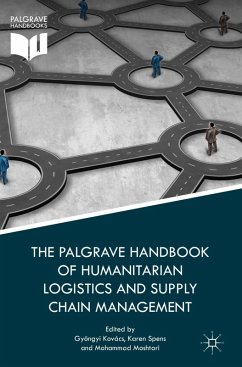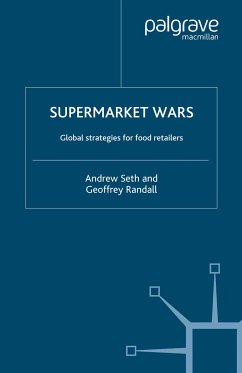
Humanitarian Logistics (eBook, PDF)

PAYBACK Punkte
19 °P sammeln!






Imagine planning an event like the Olympics. Now imagine planning the same event but not knowing when or where it will take place, or how many will attend. This is what humanitarian logisticians are up against. Oversights result in serious consequences for the victims of disasters. So they have to get it right, fast.
Dieser Download kann aus rechtlichen Gründen nur mit Rechnungsadresse in A, B, BG, CY, CZ, D, DK, EW, E, FIN, F, GR, HR, H, IRL, I, LT, L, LR, M, NL, PL, P, R, S, SLO, SK ausgeliefert werden.
'This book is a great example of our commitment at INSEAD to develop responsible leaders. It is very timely given the rapidly increasing acknowledgement of the importance of the social impact of organizations. The cases and recommendations in this book will be very helpful to anyone seeking to maximize their impact on humanitarian disaster relief.' - Dean Frank Brown, INSEAD 'As the UN's lead logistics organization we have a responsibility to look for benchmark practices both in the traditional humanitarian community but also in the private sector. The partnership with TNT has allowed us to do just that. Humanitarian logistics are very different from private sector logistics, but we can learn a great deal from each other, as this book amply demonstrates.'- Josette Sheeran, Executive Director at World Food Program 'Since 2002 we support WFP with our core competences to develop supply chain solutions; moreover we acknowledge the importance of logistics in disaster relief and the role the private sector can play in this field. This book gives an insight of the importance of humanitarian logistics and the challenges that lie ahead.' - Peter Bakker, TNT Chief Executive Officer 'I highly recommend to humanitarian logistics professionals as well as business supply chain practitioners. This is the first book that has integrated effective approaches in humanitarian logistics and business supply chain management in a most instructive and inspiring manner, and both sectors can learn so much from it.' - Hau Lee, Thoma Professor, Graduate School of Business, Stanford University.
Produktdetails
- Verlag: Palgrave Macmillan UK
- Seitenzahl: 178
- Erscheinungstermin: 19. Februar 2009
- Englisch
- ISBN-13: 9780230233485
- Artikelnr.: 38178774
"This book is a great example of our commitment at INSEAD to develop responsible leaders. It is very timely given the rapidly increasing acknowledgement of the importance of the social impact of organizations. The cases and recommendations in this book will be very helpful to anyone seeking to maximize their impact on humanitarian disaster relief." - Dean Frank Brown, INSEAD
"As the UN's lead logistics organization we have a responsibility to look for benchmark practices both in the traditional humanitarian community but also in the private sector. The partnership with TNT has allowed us to do just that. Humanitarian logistics are very different from private sector logistics, but we can learn a great deal from each other, as this
"As the UN's lead logistics organization we have a responsibility to look for benchmark practices both in the traditional humanitarian community but also in the private sector. The partnership with TNT has allowed us to do just that. Humanitarian logistics are very different from private sector logistics, but we can learn a great deal from each other, as this
Mehr anzeigen
book amply demonstrates." - Josette Sheeran, Executive Director at World Food Program
"Since 2002 we support WFP with our core competences to develop supply chain solutions; moreover we acknowledge the importance of logistics in disasterrelief and the role the private sector can play in this field. This book gives an insight of the importance of humanitarian logistics and the challenges that lie ahead." - Peter Bakker, TNT Chief Executive Officer
"I highly recommend to humanitarian logistics professionals as well as business supply chain practitioners. This is the first book that has integrated effective approaches in humanitarian logistics and business supply chain management in a most instructive and inspiring manner, and both sectors can learn so much from it." - Hau Lee, Thoma Professor, Graduate School of Business, Stanford University.
"Since 2002 we support WFP with our core competences to develop supply chain solutions; moreover we acknowledge the importance of logistics in disasterrelief and the role the private sector can play in this field. This book gives an insight of the importance of humanitarian logistics and the challenges that lie ahead." - Peter Bakker, TNT Chief Executive Officer
"I highly recommend to humanitarian logistics professionals as well as business supply chain practitioners. This is the first book that has integrated effective approaches in humanitarian logistics and business supply chain management in a most instructive and inspiring manner, and both sectors can learn so much from it." - Hau Lee, Thoma Professor, Graduate School of Business, Stanford University.
Schließen
Für dieses Produkt wurde noch keine Bewertung abgegeben. Wir würden uns sehr freuen, wenn du die erste Bewertung schreibst!
Eine Bewertung schreiben
Eine Bewertung schreiben
Andere Kunden interessierten sich für











